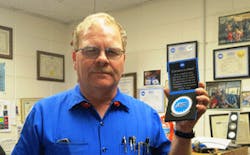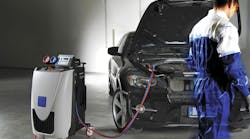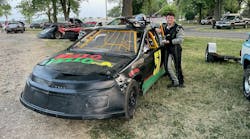Richard McCuistian, a contributor to Motor Age for nearly 20 years, penned his last article for the magazine in May. We asked him to take a look back at his time with the magazine, what stood out and what he's seen change.
Is there a favorite article or topic in particular that stands out from what you have covered during your time with Motor Age?
I love doing Motor Age Garage articles, and the readers I talk to like the fact that I tend to tell more than one story in each piece I write – we’re busy enough in my automotive department doing real repairs that I have a lot of fodder for that. And while most MAG articles these days are focused on electronics and driveability, (those seem to be the most popular), I like to talk about the tough nuts and bolts stuff we face as well.
What do you see as the most significant change to the industry in your 19 years writing?
Well, the obvious answer to that question would be the changing technology and the burgeoning electronics. Then there’s the information sharing that goes on, which helps everybody. There are entire Facebook pages dedicated to sharing scope patterns and diagnostic stories from some of the most capable people in the industry. These guys are tough, smart, and articulate and they do incredible things in their own shops and are more than willing to help other technicians – that’s becoming the backbone of this industry, because everybody needs a hand now and then. This is a tough job, and it gets tougher all the time. Training has become more intense and it seems to me that there are large groups of highly qualified (and young) instructors who really have their heads on straight and know what they’re talking about. At the same time, consumers are less knowledgeable than ever before about their own vehicles – some of the consumers I meet aren’t even sure what year model their vehicle is, let alone which engine they have. And sometimes they know their car has a problem (or they might not), but they don’t know how to describe what’s going on, and there are no DTCs stored for things like squeaks, rattles, or alignment issues.
What is the most important attribute needed for those wanting to be successful in the service repair industry?
You need to be a patient person who genuinely wants to help people. Patience is first and foremost, both with the customers and the vehicle itself. Secondly, you need to be humble and willing to admit mistakes when they’re made, and you need to realize that, while you may run 50 cars a day through your shop, every vehicle represents a customer’s trust in you. Transparency is important too – as mentioned above, there are customers who aren’t that knowledgeable, and there are other customers who are very sharp and will know if you’re not talking straight with them. If you betray that trust just because you want to make a lot of money, it’ll bite you in the end. A good reputation is more important than an extra dollar (or an extra thousand). Finally, you need to stand behind your work and follow through on any promises/commitments you’ve made to your customer and your employees, or neither of them will stick with you for long. Everybody is looking for somebody they can trust and enjoy working with. And even if you’re the best at what you do, it doesn’t give you a license to be an arrogant jerk. Pride always goes before a fall. Be humble, friendly, and always even-tempered, slow to speak and quick to listen to and ponder what others are saying rather than mentally crafting your reply while they’re speaking. A person who is easily angered and frustrated needs a different line of work.
What do you wish you would have learned sooner in your career?
I worked on vehicles with Dad at his shop from my earliest teen years, and after I became a professional mechanic in the mid – 70s, I worked for six years in the field before I ever saw my first wiring schematic, and it opened a whole new world for me. Having done lots of successful repairs, I believed I knew and understood electrical systems, but much is hidden from the person who doesn’t have a schematic. Likewise, I rebuilt more than a few manual and automatic transmissions but couldn’t explain the power flow – I was just disassembling and reassembling while replacing bearings, clutches, seals, etc. Like many of the students I teach today, I tended to “wing it” rather than doing research – I wish I had learned that earlier and it would have saved me a lot of unnecessary work.
What have you found most rewarding throughout your career?
There’s nothing quite like having fought a tough one, found the problem, corrected it, and made the final test drive with the customer. For years at the Ford dealer we fought a fleet of Chrysler K cars that never seemed to idle right, and when I finally discovered how to fix those so they wouldn’t stumble or stall when the A/C compressor kicked on, I felt a kind of satisfaction that can’t be bought anywhere. Helping other mechanics figure things out is another rewarding experience I wouldn’t trade for anything. During my heyday at the Ford place, I was the answer man people called from all over town, and I always tried my best to help them – sometimes I’d even drive across town or across the state line to give somebody a hand. I once got a call from South Africa and helped a man get a Jeep Cherokee started that had stumped a bunch of Italian mechanics. That’s another high money can’t buy. It always seemed to me that the more I shared with others, the smarter I got – in other words, the measure we give is the measure we receive. That’s the crux of what being in this business has meant to me.


